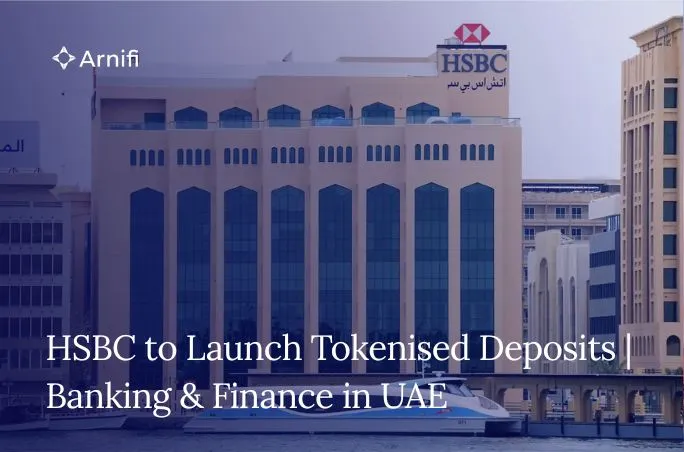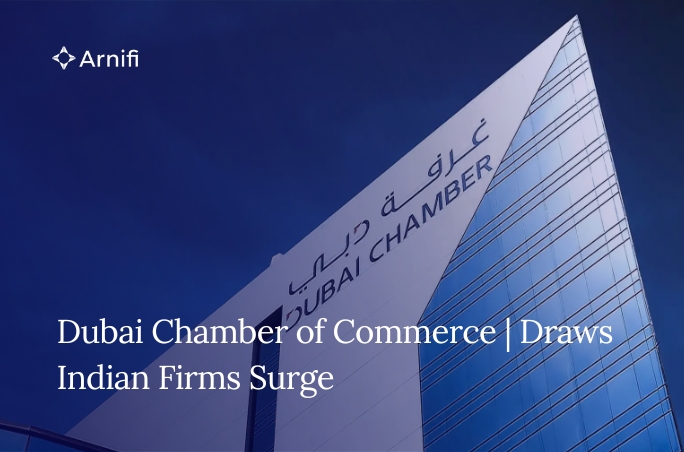HSBC to Introduce Tokenised Deposits in UAE | A Transformative Leap for Banking and Finance in Dubai
by Ishika Bhandari Nov 21, 2025  7 MIN READ
7 MIN READ

Table of contents
- A Major Step in the UAE’s Digital Financial Transformation
- What Tokenised Deposits Mean for Corporate Clients?
- Key highlights:
- Why Dubai and the UAE Are Ideal Launch Markets?
- How the System Will Work in UAE Corporate Banking?
- Competitive Benefits for Banking and Finance in Dubai
- Challenges Ahead
- A Significant Milestone for the UAE’s Financial Future
Preparing for a roll-out of tokenised deposits for corporate clients in the United Arab Emirates, HSBC is paving the way to a milestone for the banking and finance industry in the UAE. The bank’s long-term global strategy comprises the move of modernising payments and treasury services using blockchain and has the potential to radically transform liquidity management, cash flow optimisation, and real-time settlements for corporates across Dubai and the Emirates.
Thus, this rollout puts Dubai once again in the pole position of digital financial innovation and strengthens its position as the global launchpad for next-generation fintech developments. Tokenisation, deeply embedded as a global banking trend, means that the move by HSBC marks the dawn of a new era in Banking and Finance in Dubai.
A Major Step in the UAE’s Digital Financial Transformation
Contrary to conventional bank transfers encumbered by restrictions like business hours and cut-off times, the tokenised deposits will allow near-instant settlement and thereby change the way companies in Dubai do their treasury operations. The bank stated that this service would allow corporate clients to move funds instantly, 24/7, using blockchain infrastructure.
HSBC executives were quoted as stating that tokenised deposits form a core part of the Group’s international strategy to modernise treasury infrastructure. They argue that corporate clients are increasingly demanding payments and liquidity operations that are automated, fast, and efficient, needs that cannot be fully met by traditional banking rails. Operating across time zones makes the UAE the natural pilot market.
For UAE banking and finance, it is a shift from digital convenience to digital architecture. Banks are no longer satisfied with the classic online banking offerings and are beginning to re-architect existing systems into a distributed-ledger technology back end.
What Tokenised Deposits Mean for Corporate Clients?
Tokenised deposits are digital representations of real cash deposits living on a blockchain network. Funds from a traditional bank account are converted into digital “tokens” that can be instantly transferred within the bank’s blockchain ecosystem.
Key highlights:
1. Real-time, 24/7 settlement
Transfers are no longer bank-hour dependent, benefiting multinationals in Dubai that have cross-border cash movements.
2. Full regulatory and balance sheet backing
While stablecoins are generally issued by fintech companies, the tokenised deposits are fully collateralised by regulated bank deposits. They are the bank’s liability; hence, corporate clients enjoy the same credit exposure and protection under law as their conventional accounts.
3. Programmable payments
Enterprises can code logic into their transactions that will automate invoice payments, liquidity sweeps, escrow triggers, and far more advanced treasury capabilities.
4. Enhanced cash visibility
As each tokenized transfer sits on a shared ledger, treasury teams see with much greater clarity into real-time cash positions across subsidiaries and markets. For large corporates operating in Dubai’s fast-paced sunshine state, these capabilities are a significant operational advantage.
Why Dubai and the UAE Are Ideal Launch Markets?
HSBC’s decision to use the UAE, with a special focus on Dubai, as the market for early adoption doesn’t happen out of mere coincidence. The region is very favorable for banking innovations that embrace blockchain on account of numerous structural and economic factors.
1. A global hub for corporate headquarters
Dubai is a global center for numerous international companies, with their treasury operations scattered across continents. Quick settlement and automated liquidity management systems become extremely valuable.
2. Government-led digital innovation
The proactive attitude of the UAE government towards fintech regulation, digital transformation, and blockchain adoption has created a space where banks would like to bring their innovative technology tests.
3. Rapidly evolving financial markets
Recently, the UAE has unveiled digital bonds, a virtual-asset framework, and every new fintech licensing scheme, which significantly enhance its stature in the banking and finance landscape.
4. A strategic gateway between East and West
Dubai, lying strategically in the Asian and European time zone purview, thus placing the city as a central fountainhead for global corporate treasury operations, where payment settlement delays can incur huge costs. The tokenised deposits fit seamlessly into the regional vision of constructing a state-of-the-art financial infrastructure.
How the System Will Work in UAE Corporate Banking?
Next year, when HSBC launches the service, eligible corporate clients will have access to digital wallets associated with their existing HSBC accounts. These wallets will store tokenised versions of fiat currencies, for example, UAE dirhams, that mirror real deposits held with the bank.
Corporate treasurers will thus be able to:
- Instantly transfer funds between subsidiaries
- Automate treasury workflows
- Move liquidity across regions with no limitation on time zones
- Improve intraday forecasting
- Reduce settlement and reconciliation risks
These will be especially impactful in Dubai’s active corporate sectors, including logistics, commodity trading, retail, and aviation.
Competitive Benefits for Banking and Finance in Dubai
The introduction of tokenised deposits has enhanced Dubai’s financial ecosystem in many ways:
1. Enhanced Treasury Efficiency
Faster payment settlements bring more value to the clients and diminish the friction in the current banks’ slow-moving processes.
2. Lower Operational Risk
Blockchain establishes a reduction in errors for reconciliation, and it provides transaction transparency.
3. Greater liquidity optimisation
Surplus cash is managed more effectively by corporations, boosting financial results.
4. Strengthened trust in digital-money systems
Since deposit tokens are backed by a regulated bank, they provide a safe and trustworthy option as compared to unregulated or privately issued digital currencies.
5. Reinforcement of Dubai’s status as a global fintech hub
Dubai continues to establish itself as an innovation hub for digital assets, blockchain, and tokenised financial instruments, thus reinforcing the banking and finance space in Dubai.
Challenges Ahead
Nonetheless, some challenges ought to be addressed on the part of HSBC and regulators as they move forward:
1. Regulatory clarity
Token-based deposits are quite new for regulators, and they will require a clear framework around capital treatment, consumer protection, and operational supervision.
2. Corporate adoption
While Treasury departments delay the take-up of new technology by not having an internal expert who provides proof of stability, the movement could still be made.
3. Interoperability with other systems
Eventually, a token network should interface and connect to a cross-border settlement platform to realize full value.
4. Cybersecurity and operational resilience
To counteract hacks and downtimes, strong guardrails for distributed ledger systems are needed.
However, according to industry analysts, the UAE is well-positioned to overcome these challenges due to its strong reputation in the regulatory field.
A Significant Milestone for the UAE’s Financial Future
HSBC’s tokenised deposits launch in the UAE is much more than a tech upgrade; it is also a statement of the evolution of financial systems in Dubai.
By adopting blockchain and tokenisation, the UAE is heading down a most futuristic path that has:
- Payments are instant
- Liquidity flows seamlessly
- Treasury operations are automated
- Digital assets coexist with traditional banking
- Corporations operate with greater efficiency and transparency
The UAE banking and finance sector has arrived at a turning point. As more and more institutions consider tokenisation and as regulations are put in place to create an enabling framework, Dubai stands to emerge as the most mature digital-finance ecosystem in the world.
In short, HSBC’s tokenised deposits project is likely to catalyse Dubai’s growth into an international leader in digital banking innovation, ushering in transformative changes in the way corporations work with money across the region and beyond.
Top UAE Packages

Related Articles
Top UAE Packages



